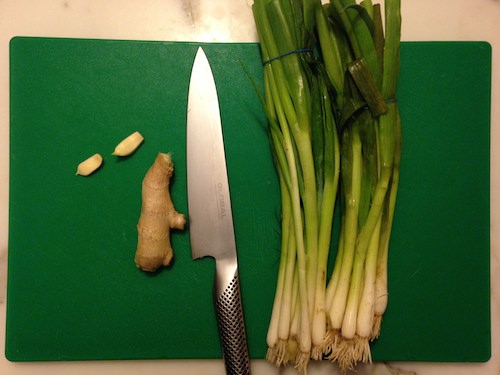How to substitute ingredients in Chinese recipes
 People get anxious when thinking about cooking Chinese food. The dishes seem so exotic – the ingredients must be strange! A typical question that friends have asked when I share a recipe: “Does it require some weird spice or special ingredient that I have to get at an Asian supermarket?” I’m happy to tell you that in the collection of dishes I prepared for Easy Chinese Recipes In 30 Minutes, all ingredients can be purchased at practically any large supermarket. Soy sauce, sesame oil, scallions, ginger, and tofu are no longer considered hard-to-get ingredients. People use them for ethnic dishes, or sometimes flavorings or enhancers for salads or vegetarian cooking. In fact, you may already have a bottle of soy sauce or a hunk of ginger in your kitchen. Both ingredients will go a long way in this book.
People get anxious when thinking about cooking Chinese food. The dishes seem so exotic – the ingredients must be strange! A typical question that friends have asked when I share a recipe: “Does it require some weird spice or special ingredient that I have to get at an Asian supermarket?” I’m happy to tell you that in the collection of dishes I prepared for Easy Chinese Recipes In 30 Minutes, all ingredients can be purchased at practically any large supermarket. Soy sauce, sesame oil, scallions, ginger, and tofu are no longer considered hard-to-get ingredients. People use them for ethnic dishes, or sometimes flavorings or enhancers for salads or vegetarian cooking. In fact, you may already have a bottle of soy sauce or a hunk of ginger in your kitchen. Both ingredients will go a long way in this book.
On those rare occasions when a recipe mentions something that’s truly exotic, I always give common substitute ingredients. For example, Chinese rice wine can be replaced by white wine, beer, or water. Don’t have rock sugar? Use brown sugar or even table sugar. One other thing to keep in mind as you prepare your ingredients: Don’t worry if you don’t have the exact quantity. Adjustments, substitutions, and estimates are a normal part of cooking, and can lead to some interesting variations.
Here is a quick list of some common Chinese ingredients and substitutes that will work:
Rice wine: Substitute ingredients include white wine (dry white wine is best) or sake. Beer will work, too. Western spirits are usually too strong to substitute for white wine, though.
Mirin (sweet rice wine): A small amount of table sugar in white wine, or sherry.
Rock sugar: Brown sugar will work, or smaller quantities of white table sugar.
Peanut oil: Vegetable oil is the best substitute ingredient, but olive oil is OK, too. My husband stir-fries some vegetables and mushrooms using a small amount of butter, which works but may burn if the wok temperature is to hot.
Scallions: If you don’t have scallions handy, thinly sliced onions can be substituted. I’ve used leeks as a stand-in for dishes like beef with scallions, but increase the amount used (one leek for 3 scallions).
Ginger: This is tough one — the best substitute I’ve found is ginger powder.
Chinese cabbage/bok choi/Napa cabbage: Round cabbages found in American supermarkets can be used if long Chinese cabbages are not available. As a last resort: Lettuce works, particularly for soups.
For more information about my cooking philosophy and some tasty, easy recipes, please check out my cookbook!
